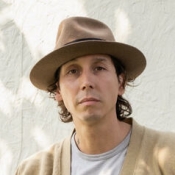ASU faculty member awarded NEH grant for Día de los Muertos book

Matthew Sandoval will use the $60,000 grant to take a sabbatical from teaching at Barrett to finish his book, "A Cultural History of Day of the Dead: How Día de los Muertos Became Mexican." Courtesy photo
Mathew Sandoval, associate teaching professor and Dean’s Fellow for Access and Inclusive Excellence in Barrett, The Honors College at Arizona State University, has received the Public Scholar award from the National Endowment for the Humanities.
In addition to being one of NEH’s most competitive grants, the Public Scholar award is part of a White House initiative to promote cross-cultural understanding.
“I feel blessed. This is the most prestigious honor I’ve received in my professional career,” Sandoval said.
Sandoval will use the $60,000 grant to take a sabbatical from teaching at Barrett to finish his book, "A Cultural History of Day of the Dead: How Día de los Muertos Became Mexican."
Sandoval said his book illustrates how Day of the Dead became a symbol of national identity during the Mexican Renaissance era, roughly 1920–1950, a time when the Mexican government was engaged in a nation-building project meant to heal and unify the country after the brutal civil war known as the Mexican Revolution.
“But this is way more than just a history book. I’m trying to change the way people understand Day of the Dead, which most folks think of as a ‘Mexican’ thing,” he said.
“It’s way more complicated than that. In my book I focus on the ways that artists, intellectuals and government officials promoted Día de los Muertos as an expression of Mexican cultural identity using magazines, paintings, books, museum exhibitions, tourism and movies. And all these efforts paved the way for Day of the Dead’s current global popularity and its instantly recognizable skull and skeleton imagery,” Sandoval said.
Sandoval’s book is unique from others about Day of the Dead because he is taking a different approach to the topic by looking at it in a transborder context.
“Those who were involved in promoting Day of the Dead as ‘Mexican’ tended to be transnational citizens who spent time living in Mexico, the U.S. and Europe and who worked in cross-border collaboration to help popularize Day of the Dead in both Mexico and the U.S.,” he said, adding that he is exploring the cultural partnerships between individuals and institutions that bridged the U.S.-Mexico border.
Sandoval’s book is the product of eight years of mixed methodology inquiry — including archival research at museums and libraries in Mexico, California, New York, Chicago and Washington, D.C. — and annual ethnographic research on large-scale public Día de los Muertos celebrations in Los Angeles, Mexico City, Phoenix and Tucson, Arizona.
The Public Scholar grant supports the creation of a well-researched nonfiction book that will appeal to a large audience of general readers.
“That’s another reason why the Public Scholar award is so meaningful for me. I’m definitely writing for general readers rather than scholars with advanced degrees. I’ve put a lot of effort into translating my research into more popular media, and finding ways to share my ideas with large and diverse audiences has been my professional focus,” Sandoval said.
Sandoval has published several articles about Day of the Dead that were distributed by the Associated Press and published in hundreds of media outlets in the U.S., Latin America and Europe. He also regularly contributes to reporting about Día de Los Muertos in major media outlets like the NBC "Today" show, NPR, The Washington Post and Los Angeles Times.
He currently is partnering with the Latino political research organization Equis and the art and media company Amplifier to create educational curriculum about Día de los Muertos for schools nationwide, which will reach more than a million students.
More Arts, humanities and education

ASU English professor directs new Native play 'Antíkoni'
Over the last three years, Madeline Sayet toured the United States to tell her story in the autobiographical solo-performance play “Where We Belong.” Now, the clinical associate professor in…

ASU student finds connection to his family's history in dance archives
First-year graduate student Garrett Keeto was visiting the Cross-Cultural Dance Resources Collections at Arizona State University as part of a course project when he discovered something unexpected:…

ASU alumna makes her way back to the ASU Gammage stage for '¡azúcar!'
As the Los Angeles-based CONTRA-TIEMPO dance group prepares for its upcoming production “¡azúcar!” at ASU Gammage, for one member of the dance group it is also a nostalgic return to her home.Born in…
